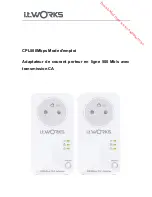
3.3. Adding DOS Box Support (Optional)
DOS Box support for the USB Serial Adapter is useful if you intend to use DOS
applications, but not necessary for Windows
®
applications. If you are using
only Windows
®
applications, it is recommended that you do not install this
feature as it uses resources. For more information about using DOS Box
applications, see section 4.4. Enabling DOS Box support requires one IRQ and
a range of eight memory locations in order to function. In addition, some DOS
applications require certain IRQ and memory configurations to be associated
with specific COM ports. To enable DOS Box support for a USB Serial Adapter
device, follow the instructions below.
1. Right-click on the “My Computer” icon on your desktop.
2. Click “Properties” from the menu that appears.
3. Click the “Device Manager” tab on the System Properties page.
4. Click the “+” next to Ports (COM & LPT).
5. Click “USB Comm Port” (ComX) where X is the port number of the
device to which you’d like to add DOS Box support.
6. Click the “Properties” button.
7. Click the “DOS Box” tab.
8. Click the box next to Enable DOS Box 16550 Emulator. A check mark
will appear in the box.
9. Choose a DOS name for the port from the list box next to Logical Device
Name (DOS Box). Many DOS applications will only work with COM1-
COM4. If you don’t want any of these, choose COMX. Click “OK”.
10. You will be asked for the “USB to Serial installation” CD. Insert the
installation CD into your CD drive and click “OK”. If a dialog pops
up stating that a file could not be found, make sure that the
“Copy files from:” edit box contains the name of your CD drive along
with “:\Win
®
98” and click “OK”.
Once DOS Box support is enabled for a specific USB Serial Adapter device,
and additional Port entry in the “Device Manager” will be created, labeled
“16550 COM Port Emulator”. You will also be able to disable and enable this
feature.
To disable or re-enable DOS Box support, follow steps 1-6 above. If you are
disabling DOS Box support, the check mark will disappear.
5
Summary of Contents for F5U103
Page 1: ...USB Serial Adapter User Manual F5U103 P73309 ...
Page 2: ......




























